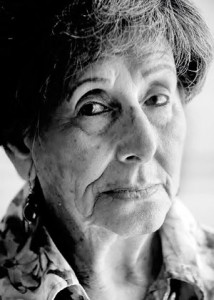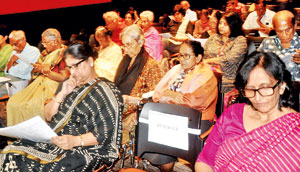EWC looks forward while remembering with gratitude their founding inspiration

Anne Ranasinghe: In reflective mood. Pic by Dominic Sansoni/threeBlindMen
2016 began with cause for celebration and ended with deep grief for the English Writers Collective. The year marked 25 years of existence for a group that has become a Sri Lankan institution, but it also lost a guiding spirit with the recent passing of founder member Anne Ranasinghe.
“Quite simply, Anne Ranasinghe was the EWC,” says Ashok Ferrey, himself a former chairman. “Filling a much needed void in Sri Lankan English literary circles she ruled the society with an iron hand for many long years; and when she felt it needed young blood she more or less bullied me into taking over, little realizing I was hardly the young writer she took me to be.”
Anne worked closely with Rajiva Wijesinha, another founder member of the EWC, to bring this long cherished project to life. Wijesinha is pleased that the organisation they launched together has thrived these 25 years. “When I put forward the initial plan, management was easy because we got generous support from the British Council, but those who took over have had a much more difficult task. I think Anne Ranasinghe, who ran the organisation when my work started taking me out of Colombo and I had to give up, and now Vijita Fernando, must be congratulated for keeping things going in a more difficult context,” he says.
The organisation has changed over the years – growing in size and opening up its membership even to amateur writers. “But I am glad it evolved to include everyone interested in writing in English, because many of those earlier distinguished writers are no more and it is necessary to work with new generations,” says Wijesinha.
The easy acceptance that writing in English receives among contemporary Sri Lankan readers was hard won. To Wijesinha the very existence of the EWC was “a seal on what I fought for, at a time when other academics were highly critical of Sri Lankan writing in English, and discouraged our writers,” he explains, adding “Because of strong support from imaginative Representatives at the British Council, we were able to highlight the achievements of Sri Lankan writers and ensure an outlet for their talents in the form of Channels, which came out four times a year at first, and then twice a year for about a decade.”
Vijita Fernando, who was chairperson from 2012 – 2014 says that the organisation’s driving spirit has been to improve the quality of English creative writing and to give budding writers in Sri Lanka opportunities to hone their skills and a platform through which to showcase them.
Among the EWC’s regular activities have been an annual seminar on short story and poetry with talks by academics. An informal atmosphere allowed participants freedom to ask questions, says Fernando. “Recently we have had half day sessions on the short story alone – Shehan Karunatilaka conducted one in 2016, and Madhubhashini Ratnayake spoke to us in 2015.” The EWC has hosted regular conversations with established writers, including Shyam Selvadurai,Tissa Jayatilleke, Ranjini Obeyesekere, Maithree Wickremasinghe, Daya Dissanayake, Sunila Galappatti and Madhubhashini Ratnayake. Another highlight is the annual interview of the current year’s Gratiaen Award winner.

Latest EWC event: An evening of poetry and prose held at the Indian Cultural Centre on November 25. Pic by Nilan Maligaspe
Today, the EWC publishes the journal Channels annually, and invites short story and poetry submissions from the public. Winners are given a cash prize and space on the pages of the journal. “The magazine has given budding writers not only a space to publish their work, but the confidence to play the game of fiction writing at a higher level,” says Lal Medawattegedera, another former chairperson.“A hard-won entry in the Channels is the first step towards greatness, possibly for many writers.”
For the current chairperson M.T.L. Ebell, all these activities of the EWC have fuelled great personal growth. “The ability to mingle with writers who have ‘made it’ and gaining insights into their personal odysseys has been a source of inspiration to me,” she told the Sunday Times.
It’s clear that going forward the organisation faces very specific challenges. “There was a need for the EWC to come into the 21st century,” says Ebell, pointing to recent efforts to start a Facebook page and update their website. She feels there is a pressing need to dispel what she labels the myth that “EWC is a la-di-dah association of society women who sip champagne and discuss the alternatives of potato and potaHto.” Instead, the group needs to attract younger members, and find funding and sponsorship if it is not simply fade away. “Members must be ready to put themselves out there to serve other writers’ needs,” says Ebell.
Medawattegedera adds that in his opinion Sri Lankan writers working in English face fundamental challenges like getting good feedback for work, working with good editors and having one’s work published in mature spaces where creative writing is celebrated. “The future for the EWC, as I see it,” says Medawattegedera,“is to keep offering these services to writers and if possibly, tie up with a global publishing house to give Channels more international exposure.”
“I think the biggest success of EWC lies in the fact that it has managed to churn out some of the finest writers that the country has ever seen,” says Jayani Senanayake, a relatively new member of the organization. Senanayake says she used to be one of those writers just scribbling for herself, and as a result was quite isolated. “But when I got invited to join the EWC after winning their Channels poetry competition, my perception on writing changed drastically. I think it’s fair to say that joining the EWC built my confidence into finally sharing my work with the public and eventually publishing my own poetry collection and other works.”
As it faces another year, the organisation will have to adapt if it is to support a new generation of writers in Sri Lanka and to continue the good work of nearly three decades. But before the rush of a new year begins, Sri Lankan readers and writers will pause to remember a pillar of their community. For Ferrey, Anne Ranasinghe remains a source of profound inspiration. With unabashed emotion, he tells the Sunday Times: “I will remember her with reverence for the sheer magic of her poetry, which I had the privilege to read aloud on countless occasions; and I will remember her with gratitude, for the freshly-made patties she always took the trouble to serve, on those long gossipy afternoons in the strictly ordered calm of her red-oxide study.”


